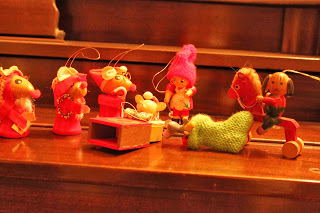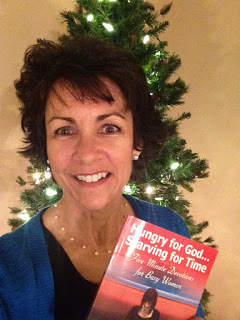Lori Hatcher's Blog: Refresh Blog, page 75
December 24, 2015
Are You Broken This Christmas?
This post first appeared on HFG in December 2013. It remains one of my favorite Christmas posts.
Money was tight that first Christmas.
So tight that when we bought an artificial tree for $30 and it went on sale the following week, we stuffed it back in the box and returned it. By the time we’d made our way to the garden center, the sales clerk had hauled back the tree we’d just returned, and we bought it again—for $10 less. We bought three bags of red and white satin ornaments with the difference. Unfortunately, even though the tree wasn’t very big, the bags of cheap balls didn’t go very far.
 The next day we were grocery shopping when a bin of ornaments caught my eye. The sign read
Four for $1
, which sounded too good to be true. As I examined each bagged wooden ornament, I saw why they were so cheap—they were all broken. A little girl on skis lacked a pole, a mouse dressed to look like a Wise Man was missing the red ball on his nose, and a bear on a rocking horse needed a wheel.
The next day we were grocery shopping when a bin of ornaments caught my eye. The sign read
Four for $1
, which sounded too good to be true. As I examined each bagged wooden ornament, I saw why they were so cheap—they were all broken. A little girl on skis lacked a pole, a mouse dressed to look like a Wise Man was missing the red ball on his nose, and a bear on a rocking horse needed a wheel.
“They’re all broken,” I said, dismissing them and moving on.
“But all the parts are here,” my husband said, looking closer, “I think I can fix them.”
“That’s too much work,” I said, shaking my head. “They’re not worth it.”
“I’d like to try,” he said. “I think I love them.”
And fix them he did. With painstaking care and incredible patience, he glued each broken part back on, even creatively improvising when the pieces were too damaged to be restored. When the glue was dry, he hung them on the tree among the satin balls.
“See,” he said with a smile, “I told you I could fix them.”
 Since that first Christmas, we’ve added many ornaments to our tree. We replaced the satin balls long ago, but every year we continue to hang the little wooden ornaments. They remind us of how far we’ve come, how blessed we are, and what God did for us on the very first Christmas.
Since that first Christmas, we’ve added many ornaments to our tree. We replaced the satin balls long ago, but every year we continue to hang the little wooden ornaments. They remind us of how far we’ve come, how blessed we are, and what God did for us on the very first Christmas.
You see, like the ornaments in the bin, we were practically worthless. Broken and discarded, we weren’t much to look at, but God took pity on us.
“I think I can fix them,” he said. “I’d like to try.”
“I love them.”
And with painstaking care and incredible patience, he applied the blood of Jesus to every broken part, even creatively improvising when parts of us were too damaged to be restored. And then he added us to his family tree and smiled.
“See,” he said, “I told you I could fix them.”
“I will search for the lost and bring back the strays,” says the Lord, “I will bind up the broken and strengthen the weak,” (Ezekiel 34:16).
 What’s your story this Christmas?
What’s your story this Christmas?
Has God repaired what was broken and placed you in his family tree? Do you know him as your Savior? If you do, rejoice. If you don’t, please CLICK HERE for more information about how to have a relationship with God.
You’ve lived broken long enough. It’s time to let God make you whole.
If you're reading by email, click here to watch The Silent Monks sing the Hallelujah Chorus.
If you enjoyed this post, why not subscribe? I'll send you twice-weekly 5-minute devotions to help nourish your soul.
Because women need to connect with God in the craziness of life.
Enter your email address and VALIDATE the Feedburner email sent to your inbox.
Delivered by FeedBurner
If this post was meaningful to you, would you consider sharing it with a friend by clicking on one of the buttons below? Did you know you can receive bi-weekly Hungry for God posts sent directly to your email inbox? Visit http://www.lori-benotweary.blogspot.com and click on the link in the right hand corner to Subscribe Via Email.
Copyright 2012 by Lori Hatcher
Money was tight that first Christmas.
So tight that when we bought an artificial tree for $30 and it went on sale the following week, we stuffed it back in the box and returned it. By the time we’d made our way to the garden center, the sales clerk had hauled back the tree we’d just returned, and we bought it again—for $10 less. We bought three bags of red and white satin ornaments with the difference. Unfortunately, even though the tree wasn’t very big, the bags of cheap balls didn’t go very far.
 The next day we were grocery shopping when a bin of ornaments caught my eye. The sign read
Four for $1
, which sounded too good to be true. As I examined each bagged wooden ornament, I saw why they were so cheap—they were all broken. A little girl on skis lacked a pole, a mouse dressed to look like a Wise Man was missing the red ball on his nose, and a bear on a rocking horse needed a wheel.
The next day we were grocery shopping when a bin of ornaments caught my eye. The sign read
Four for $1
, which sounded too good to be true. As I examined each bagged wooden ornament, I saw why they were so cheap—they were all broken. A little girl on skis lacked a pole, a mouse dressed to look like a Wise Man was missing the red ball on his nose, and a bear on a rocking horse needed a wheel. “They’re all broken,” I said, dismissing them and moving on.
“But all the parts are here,” my husband said, looking closer, “I think I can fix them.”
“That’s too much work,” I said, shaking my head. “They’re not worth it.”
“I’d like to try,” he said. “I think I love them.”
And fix them he did. With painstaking care and incredible patience, he glued each broken part back on, even creatively improvising when the pieces were too damaged to be restored. When the glue was dry, he hung them on the tree among the satin balls.
“See,” he said with a smile, “I told you I could fix them.”
 Since that first Christmas, we’ve added many ornaments to our tree. We replaced the satin balls long ago, but every year we continue to hang the little wooden ornaments. They remind us of how far we’ve come, how blessed we are, and what God did for us on the very first Christmas.
Since that first Christmas, we’ve added many ornaments to our tree. We replaced the satin balls long ago, but every year we continue to hang the little wooden ornaments. They remind us of how far we’ve come, how blessed we are, and what God did for us on the very first Christmas. You see, like the ornaments in the bin, we were practically worthless. Broken and discarded, we weren’t much to look at, but God took pity on us.
“I think I can fix them,” he said. “I’d like to try.”
“I love them.”
And with painstaking care and incredible patience, he applied the blood of Jesus to every broken part, even creatively improvising when parts of us were too damaged to be restored. And then he added us to his family tree and smiled.
“See,” he said, “I told you I could fix them.”
“I will search for the lost and bring back the strays,” says the Lord, “I will bind up the broken and strengthen the weak,” (Ezekiel 34:16).
 What’s your story this Christmas?
What’s your story this Christmas? Has God repaired what was broken and placed you in his family tree? Do you know him as your Savior? If you do, rejoice. If you don’t, please CLICK HERE for more information about how to have a relationship with God.
You’ve lived broken long enough. It’s time to let God make you whole.
If you're reading by email, click here to watch The Silent Monks sing the Hallelujah Chorus.
If you enjoyed this post, why not subscribe? I'll send you twice-weekly 5-minute devotions to help nourish your soul.
Because women need to connect with God in the craziness of life.
Enter your email address and VALIDATE the Feedburner email sent to your inbox.
Delivered by FeedBurner
If this post was meaningful to you, would you consider sharing it with a friend by clicking on one of the buttons below? Did you know you can receive bi-weekly Hungry for God posts sent directly to your email inbox? Visit http://www.lori-benotweary.blogspot.com and click on the link in the right hand corner to Subscribe Via Email.
Copyright 2012 by Lori Hatcher
Published on December 24, 2015 01:58
December 22, 2015
The Power of Small
 No one wants to be the smallest kid in class. Or live in the smallest house in the neighborhood. Or check the survey box for the lowest tax bracket. And we seldom boast that we teach the youngest kids in the church or lead the smallest Sunday school class. When someone asks how the new church plant is going and how many members we have, we hesitate before we answer, “Twelve.”
No one wants to be the smallest kid in class. Or live in the smallest house in the neighborhood. Or check the survey box for the lowest tax bracket. And we seldom boast that we teach the youngest kids in the church or lead the smallest Sunday school class. When someone asks how the new church plant is going and how many members we have, we hesitate before we answer, “Twelve.” The small tasks that occupy our days and consume our energy are usually obscure and thankless. We wonder if God values them at all. The world seldom does.When’s the last time you received an award for Most Dishes Washed? Or Most Snotty Noses Wiped? Or Best Crock Pot Meal?
And then we read the Christmas story and the familiar narrative helps us realize that if our world is small, then we may be the very people God wants to use to do something significant.
How do we know?
This is the Christmas season. Over two thousand years ago, God executed the most important step in his plan of redemption—he sent his son into the world. And God used small to make it happen.
He used an unknown teenage girl to carry his son.
“And Mary said: ‘My soul glorifies the Lord, and my spirit rejoices in God my Savior, for he has been mindful of the humble state of his servant’” (Luke 1:46-48).
He sent her to a tiny town to give birth.
"But you, Bethlehem Ephrathah, though you are small among the clans of Judah, out of you will come for me one who will be ruler over Israel,” (Micah 5:2).
And he revealed Messiah’s advent to those insignificant people society overlooked—mangy shepherds, an elderly man, and a faithful widow(Luke 2).
"But the angel said to them, "Do not be afraid. I bring you good news of great joy that will be for all the people. Today in the town of David a Savior has been born to you; he is Christ the Lord" (Luke 2:10).
 So what does he think about you? Perhaps you feel small, seemingly insignificant, and unimportant.
So what does he think about you? Perhaps you feel small, seemingly insignificant, and unimportant. “Though the Lord is on high, yet he regards the lowly; but the proud he knows from afar.” (Psa. 128:6).
Through the ages, God has used the small to accomplish his work in the world.
But sometimes we’re don't want to be small. We chafe at routine. We despise the menial. We consider worthless what God sees as significant.
We don’t want to minister to just one person. We don’t want to influence only a few. We don’t want to work in a small office. Or no office at all. We don’t want to pour our lives into projects no one sees or pray from the sidelines while others go into battle.
We want to be up front rock stars, not behind-the-scenes roadies.
And then Christmas comes.
 And we remember Mary, who bowed her knees before Gabriel and said, "I am the Lord's servant. May it be to me as you have said" (Luke 1:38). Her breasts nursed our Savior. Her arms held him safe. Her weary hands washed his clothes and cooked his food. Her frantic eyes searched for him when he was lost. Her gentle lips kissed his boo boos and caressed his fevered brow.
And we remember Mary, who bowed her knees before Gabriel and said, "I am the Lord's servant. May it be to me as you have said" (Luke 1:38). Her breasts nursed our Savior. Her arms held him safe. Her weary hands washed his clothes and cooked his food. Her frantic eyes searched for him when he was lost. Her gentle lips kissed his boo boos and caressed his fevered brow. And we remember Simeon, righteous and devout. Instead of chafing and striving and asking, “How long?” he rested in the sweet presence of God. He grew so close to his Master that when he asked God not to let him die without seeing the Savior, God granted his request.
“Simeon took (Jesus) in his arms and praised God, saying: ‘Sovereign Lord, as you have promised, you now dismiss your servant in peace. For my eyes have seen your salvation, which you have prepared in the sight of all people, a light for revelation to the Gentiles and for glory to your people Israel’" (Luke 2:28-32).
And we remember Anna, an insignificant widow, dedicated to worship and prayer since her husband died after only seven years of marriage. No one saw her knees grow calloused from a lifetime of intercession. No one valued her curved back bent low with her prayers. No one saw her face grow lined with the cares of this world.
Yet God saw her. And rewarded her faithfulness by granting her the privilege of announcing the Messiah’s arrival to those who watched for him.
“Coming up to (Mary and Joseph) at that very moment, she gave thanks to God and spoke about the child to all who were looking forward to the redemption of Jerusalem” (Luke 2:38).
And what about you? Does God see the smallness of your life when you submit it to him?
Yes. And he rewards it.
If we are obedient, we will hear him say, “Well done, good and faithful servant; you have been faithful over a few things, I will make you ruler over many things. Enter into the joy of your lord'” (Mat. 25:23).
If you’re feeling small today, I hope the Christmas story will help you rest in the confidence that God will use your small acts of obedience to accomplish his purposes in the world around you. Trust him to make it so.
 I love the newly-designed, glossy cover!
I love the newly-designed, glossy cover!
I suspect there are quite a few busy women on your Christmas list. Friends, co-workers, fellow church members, and your children's teachers, coaches, and babysitters, just to name a few. If you'd like to give them a gift that will draw them closer to the Lord, encourage them to spend time in God's Word, and think biblically, Hungry for God ... Starving for Time, Five-Minute Devotions for Busy Women is the gift you're looking for.
And what about those special women in your life that may not have a relationship with the Lord? In the last devotion in the book, I share what it means to have a relationship with Jesus Christ. Giving someone you care about a copy of HFG is not just passing along spiritual encouragement, it's a gentle, winsome way to share the gospel.
Hungry for God . . . Starving for Time is available through Amazon.com,BarnesandNoble.com, and Lighthouse Publishing of the Carolinas.
If you live in the Columbia, South Carolina area, I'd love to autograph and personalize copies for your special friends. Email me at LoriAHatcher@gmail.com.
If you enjoyed this post, why not subscribe? I'll send you twice-weekly 5-minute devotions to help nourish your soul.
Because women need to connect with God in the craziness of life.
Enter your email address and VALIDATE the Feedburner email sent to your inbox.
Delivered by FeedBurner
If this post was meaningful to you, would you consider sharing it with a friend by clicking on one of the buttons below? Did you know you can receive bi-weekly Hungry for God posts sent directly to your email inbox? Visit http://www.lori-benotweary.blogspot.com and click on the link in the right hand corner to Subscribe Via Email.
Copyright 2012 by Lori Hatcher
Published on December 22, 2015 05:37
December 20, 2015
A Scandalous and Sobering Question: What if Mary Had Aborted her Baby?
 Mary didn't plan to get pregnant.
Mary didn't plan to get pregnant.At least not for a long time. She has a lot of living to do first. And a wedding to plan, sometime in the future, when her fiancé has saved enough money to support them.
Yet here she is—unwed, uneducated, and underage. And pregnant. Her parents are religious, and her fiancé is several years older than she.
When Mary realized she was pregnant, a thousand questions filled her mind. How will I tell my parents? What will people say? How will I provide for this baby? Will my boyfriend leave me?
Her Cinderella wedding plans vanished and the crushing prospects of life as a single mother squeezed the breath from her chest. How could this have happened, she wondered. We were so careful to conduct ourselves honorably.
Ripples from an unplanned teen pregnancy cast a wide circle. Unlike a speeding ticket, poor grades, or a curfew infraction, the impact of an unplanned pregnancy alters not just the life of a teen, but the lives of her parents, her boyfriend, her boyfriend’s parents, other family members and siblings, and friends. An unexpected pregnancy rewrites a young woman’s future—and the futures of those around her.
Most of us know someone like Mary. Some encourage these young women to get abortions.
“You can get on with your life.”
“You won’t have to put your plans on hold.”
“You can finish school, get married, and THEN have a baby.”
They fail to consider (or perhaps they ignore) the moral implications of their advice. And they seldom acknowledge that perhaps God has a plan for this “unwanted” baby. That, even in circumstances less than ideal, God is knitting this baby together in his mother’s womb for a purpose. That maybe, just maybe, this pregnancy isn’t unplanned at all. Perhaps, although the circumstances leading up to the pregnancy are less than ideal, God can still redeem them.
Which brings us to a profound and almost scandalous question: What if Mary had aborted Jesus?
If she lived today, well-meaning friends might have encouraged her to do so. And she might have considered it.
It would have been, at least at first glance, an easy way out. A way to preserve her name. A way to spare her parents shame. A way to protect her future plans.
But Mary, like so many courageous young women, did the right thing. She preserved her child's life and trusted God with her future.
And her baby changed the world.

If you’re pregnant, or you know someone who is, we know you’re not carrying the Savior of the world. But you might be carrying the scientist who discovers the cure for cancer. Or the engineer who develops the next world-changing invention. Or the pastor who leads thousands to Christ. Or the schoolteacher who lifts underprivileged children out of their hopelessness. Or the mother who trains her kids to love Jesus. Or the baby who will bring joy to everyone she meets.
More than 2,000 years ago, a teenage girl was surprised by an out-of-wedlock pregnancy—a pregnancy that changed her life forever. But it not only changed her life, it affected the lives of every human being on the planet.
"’The virgin will be with child and will give birth to a son, and they will call him Immanuel’—which means, ‘God with us’” (Mat. 1:22).
If you’d like to hear the real-time story of Josiah, another life-changing baby boy, I’d love to share this short video with you from one of my favorite ministries, Daybreak Crisis Pregnancy center. When you look into Josiah’s shiny brown eyes, I think you’ll agree—a baby changes everything.
 I love the newly-designed, glossy cover!
I love the newly-designed, glossy cover!
I suspect there are quite a few busy women on your Christmas list. Friends, co-workers, fellow church members, and your children's teachers, coaches, and babysitters, just to name a few. If you'd like to give them a gift that will draw them closer to the Lord, encourage them to spend time in God's Word, and think biblically, Hungry for God ... Starving for Time, Five-Minute Devotions for Busy Women is the gift you're looking for.
And what about those special women in your life that may not have a relationship with the Lord? In the last devotion in the book, I share what it means to have a relationship with Jesus Christ. Giving someone you care about a copy of HFG is not just passing along spiritual encouragement, it's a gentle, winsome way to share the gospel.
Hungry for God . . . Starving for Time is available through Amazon.com,BarnesandNoble.com, and Lighthouse Publishing of the Carolinas.
If you live in the Columbia, South Carolina area, I'd love to autograph and personalize copies for your special friends. Email me at LoriAHatcher@gmail.com.
If you enjoyed this post, why not subscribe? I'll send you twice-weekly 5-minute devotions to help nourish your soul.
Because women need to connect with God in the craziness of life.
Enter your email address and VALIDATE the Feedburner email sent to your inbox.
Delivered by FeedBurner

If this post was meaningful to you, would you consider sharing it with a friend by clicking on one of the buttons below? Did you know you can receive bi-weekly Hungry for God posts sent directly to your email inbox? Visit http://www.lori-benotweary.blogspot.com and click on the link in the right hand corner to Subscribe Via Email.
Copyright 2012 by Lori Hatcher
Published on December 20, 2015 16:03
December 17, 2015
When Christmas Isn't Perfect
 I watch as she feeds my granddaughter, cradled warm and soft against her. A diaper change, then a fresh, pink onesie. How gently she dresses her, poking one floppy arm, then the other through uncooperative sleeves.
I watch as she feeds my granddaughter, cradled warm and soft against her. A diaper change, then a fresh, pink onesie. How gently she dresses her, poking one floppy arm, then the other through uncooperative sleeves. “There, she’s ready,” she says, and kisses the top of her fuzzy head. “Will you hold her while I get changed?”
Will I hold her? Would I like to gaze deeply into a pink sunset or savor something sweet?
“I’d love to,” I say, and my daughter settles the baby onto my lap in one smooth motion. Lauren, the two-year-old, flits by, strokes the top of her baby sister’s head like a treasured lovey, and sings the ABC’s:
“H-I-J-K-LMNOPEEEEEEE.”
Somewhere from the Netherlands of the baby’s diaper, a discordant sound interrupts the alphabet chorus. Lauren stops in her tracks. Her eyes widen as she recognizes the familiar noise.
“Sissy poo poo.”
“Yes, Sissy poo pooed,” I acknowledge, as warm wetness forms a perfect circle on my leg. I hand Lauren a wipe, and she cleans her stuffed Minnie’s felt bottom while I gently clean the chubby cherub, who is staring up at me with a self-satisfied smile. I smile in return, shaking my head.
The Christmas season is upon us. Despite road rage and long checkout lines, people smile more. We remember to say please and thank you and look for opportunities to give sacrificially. We make time to visit with family and friends, and most gatherings are sweet and special.
But every now and then, someone poo poos.
Not literally, I hope, but inevitably something less than idyllic happens to mar the Hallmark Channel scene. Someone says something unkind, or selfish, or rude. A family member or friend expects to be served rather than serves, takes instead of giving, or criticizes instead of compliments.

When this happens, and it will, we have a choice—focus on what is wrong, or focus on what is right. We can compile a mile-long list of what’s wrong with the world, our lives, or our holiday celebrations. Or we can make an equally long list of what’s right. Even if we have to think a bit.
“Finally, brothers, whatever is true, whatever is noble, whatever is right, whatever is pure, whatever is lovely, whatever is admirable—if anything is excellent or praiseworthy—think about such things,” (Phil. 4:8).
Thank you, Lord, that Christmas is more than gifts under the tree. Christmas is Christ with us, the hope of glory.
Thank you for lifting us out of a horrible pit, out of the miry clay, setting our feet upon a rock, and establishing our goings, (Psa. 40:2). We don’t know why you saved us, but we’re so glad you did.
Thank you for our families. Flawed and frustrating though they may sometimes be, they are ours by your design. You have used them in many ways to demonstrate your faithfulness.
Thank you that your mercies are new every morning.
Thank you for providing for us all the days of our lives.
Thank you for your Holy Spirit’s presence that comforts and consoles, instructs and inspires, and empowers and emboldens. With him, we are never alone.
Thank you for those you’ve brought into our lives to walk the faith walk with us. Spouses, parents, siblings, friends. Those who love Jesus and love us give us glimpses of what eternity will be like as part of your great big family.
And thank you for Jesus, who binds up the brokenhearted and heals all their wounds.
Merry Christmas.
 I love the newly-designed, glossy cover!
I love the newly-designed, glossy cover!
I suspect there are quite a few busy women on your Christmas list. Friends, co-workers, fellow church members, and your children's teachers, coaches, and babysitters, just to name a few. If you'd like to give them a gift that will draw them closer to the Lord, encourage them to spend time in God's Word, and think biblically, Hungry for God ... Starving for Time, Five-Minute Devotions for Busy Women is the gift you're looking for.
And what about those special women in your life that may not have a relationship with the Lord? In the last devotion in the book, I share what it means to have a relationship with Jesus Christ. Giving someone you care about a copy of HFG is not just passing along spiritual encouragement, it's a gentle, winsome way to share the gospel.
Hungry for God . . . Starving for Time is available through Amazon.com,BarnesandNoble.com, and Lighthouse Publishing of the Carolinas.
If you live in the Columbia, South Carolina area, I'd love to autograph and personalize copies for your special friends. Email me at LoriAHatcher@gmail.com.
If you enjoyed this post, why not subscribe? I'll send you twice-weekly 5-minute devotions to help nourish your soul.
Because women need to connect with God in the craziness of life.
Enter your email address and VALIDATE the Feedburner email sent to your inbox.
Delivered by FeedBurner

If this post was meaningful to you, would you consider sharing it with a friend by clicking on one of the buttons below? Did you know you can receive bi-weekly Hungry for God posts sent directly to your email inbox? Visit http://www.lori-benotweary.blogspot.com and click on the link in the right hand corner to Subscribe Via Email.
Copyright 2012 by Lori Hatcher
Published on December 17, 2015 01:58
December 14, 2015
A Christmas Wish from My Publisher
Do you have a Christmas Wish List?
I do. And this year one of the things on my list (and my publisher's, Eddie Jones) is a burst in sales for my book.

You see, last year at this time, I accomplished a life-long dream--to write and publish a book. But my book competes against thousands of books on Amazon, many of which are published by well-known authors backed by big-name publishing companies. As such, my book stands little chance of cracking the top page in its sale category as it did when it first released last December.
But you can help. Today my publisher dropped the Kindle price of my book to 99 cents. Once we sell 50 copies, we'll raise the price. Then tomorrow, we'll repeat the process. 50 books at 99 cents, then raise the price. This Christmas Wish List campaign will run for four days, then we're done.
If you want to help, click on the link below and buy a copy of my book for 99 cents (if you already have one, you can gift it to a friend if you have their email). If you see a higher price, it means we've reached our sales goal for today.
And if you can't afford the 99 cents, let me know and I will GIVE YOU a $1 Amazon gift card so you can buy my Christmas present to me from you. Thanks so much for helping make this a Merry Christmas for my book.
With much love at Christmas time,
Lori
Here's the link: http://amzn.to/1J5UkJ9 If this post was meaningful to you, would you consider sharing it with a friend by clicking on one of the buttons below? Did you know you can receive bi-weekly Hungry for God posts sent directly to your email inbox? Visit http://www.lori-benotweary.blogspot.com and click on the link in the right hand corner to Subscribe Via Email.
Copyright 2012 by Lori Hatcher
I do. And this year one of the things on my list (and my publisher's, Eddie Jones) is a burst in sales for my book.

You see, last year at this time, I accomplished a life-long dream--to write and publish a book. But my book competes against thousands of books on Amazon, many of which are published by well-known authors backed by big-name publishing companies. As such, my book stands little chance of cracking the top page in its sale category as it did when it first released last December.
But you can help. Today my publisher dropped the Kindle price of my book to 99 cents. Once we sell 50 copies, we'll raise the price. Then tomorrow, we'll repeat the process. 50 books at 99 cents, then raise the price. This Christmas Wish List campaign will run for four days, then we're done.
If you want to help, click on the link below and buy a copy of my book for 99 cents (if you already have one, you can gift it to a friend if you have their email). If you see a higher price, it means we've reached our sales goal for today.
And if you can't afford the 99 cents, let me know and I will GIVE YOU a $1 Amazon gift card so you can buy my Christmas present to me from you. Thanks so much for helping make this a Merry Christmas for my book.
With much love at Christmas time,
Lori
Here's the link: http://amzn.to/1J5UkJ9 If this post was meaningful to you, would you consider sharing it with a friend by clicking on one of the buttons below? Did you know you can receive bi-weekly Hungry for God posts sent directly to your email inbox? Visit http://www.lori-benotweary.blogspot.com and click on the link in the right hand corner to Subscribe Via Email.
Copyright 2012 by Lori Hatcher
Published on December 14, 2015 09:30
December 13, 2015
4 Reasons to Mark Your Bible
It took me years to write in my Bible without looking over my shoulder.
I learned as a child that the Bible was too complex and profound for a layperson to understand. The average churchgoer in my congregation didn’t carry a Bible, because she didn’t own one. Only church leaders were allowed to read from the over-sized white Bible that occupied the hallowed place at the front of our church.
 When I was six, two ladies from the Primitive Methodist church down the street knocked on my door. Thanking my mother for allowing me to attend Vacation Bible School, they presented me with a black, gold-edged Bible with my name written inside. It was a solemn moment.
When I was six, two ladies from the Primitive Methodist church down the street knocked on my door. Thanking my mother for allowing me to attend Vacation Bible School, they presented me with a black, gold-edged Bible with my name written inside. It was a solemn moment.
For twelve years, my Bible was the only Bible in our house. Once, when I was 13, I made a New Year’s resolution to read it from cover to cover, one chapter a day. I felt quite scandalous, reading a book I’d been warned was too complex, but by January 4, I had lost interest. I returned my Bible to its place on the shelf where it sat until I was 16.
Fancying myself a poet and spending hours sitting on the shores of Narragansett Bay composing long poems about unrequited love, I discovered the poetic books of the Bible. I admired the beauty of its simile and metaphor, puzzled over its subliminal messages, but again quickly lost interest.
When I was 18 years old, I fell in love, and that changed everything. When I surrendered my life to Christ, I pulled my Bible down from the shelf again. Only this time I wasn’t reading to keep a New Year’s resolution or plumb the depths of ancient literature. I was reading to learn about Jesus, the Lover of my soul.
Hungry to discover everything I could about my new found faith, I bought a Billy Graham discipleship book from a thrift store and began looking up verses.
Friends gave me my first leather Bible. Unlike the black, cardboard-covered treasure from my childhood, this beauty had a burgundy leather cover with my name embossed in the corner. I carried it to church three times a week and read the stories behind the legends I’d thus far only heard about. Moses, Samson, and Jonah came alive, and I couldn’t get enough.
One night in Bible study, I noticed a man underlining verses and making notes in the margin of his Bible. Another woman pulled out a yellow highlighter and began to mark her copy of the Scriptures. I was horrified.
Flashbacks to my early childhood, combined with my teachers’ warnings about not writing in schoolbooks convinced me I was witnessing not only disrespect, but desecration.
As soon as Bible study ended, I cornered a friend. “Why are they writing in their Bibles?” I asked. “Isn’t that WRONG?”
 She explained that people write in their Bibles for many reasons—to mark special verses, to record notes from a memorable sermon, or to isolate promises they want to remember. Reassured, I began to think about writing in my Bible.
She explained that people write in their Bibles for many reasons—to mark special verses, to record notes from a memorable sermon, or to isolate promises they want to remember. Reassured, I began to think about writing in my Bible.
It seemed appropriate, I thought, to underline the verses that directed me into a relationship with God, six verses from the book of Romans, traditionally called The Roman Road*. It was frightening and exhilarating, all at the same time.
After those first verses, I underlined precious promises I wanted to remember. I scribbled sermon notes in the margins. I dated special passages. Instead of a museum piece, I now had a living record of my spiritual journey.
In the 34 years since then, I’ve owned several Bibles. I’ve worn the covers off paperback versions and rubbed the leather smooth on others. My current copy, a leather-bound John MacArthur One Year Study Bible is a treasure.
Just yesterday I came across verses in Jeremiah and a note in the margin claiming a promise God gave me for one of my children. Dated 2010, the promise has since been gloriously fulfilled. In the book of Mark, I recorded a prayer asking for mercy on behalf of a loved one. In Ezekiel, I underlined God’s insight into a difficult family situation. Notes on almost every page record God’s faithfulness to me and stand as an indisputable testimony of the dynamic nature of God’s living Word.
Do mark your Bible? Why or why not? What note is most special to you? I’d love to hear your thoughts. Leave a comment below and join the conversation.
*The Romans Road contains the following verses that explain salvation: Romans 3:23 Romans 3:10-18 Romans 6:23 Romans 5:8 Romans 10:9 Romans 10:13 Romans 5:1 Romans 8:1 Romans 8:38-39
If you're reading by email, Click here to listen to an absolutely beautiful rendition of Carol of the Bells (for 12 cellos) by the Piano Guys.
 I love the newly-designed, glossy cover!
I love the newly-designed, glossy cover!
I suspect there are quite a few busy women on your Christmas list. Friends, co-workers, fellow church members, and your children's teachers, coaches, and babysitters, just to name a few. If you'd like to give them a gift that will draw them closer to the Lord, encourage them to spend time in God's Word, and think biblically, Hungry for God ... Starving for Time, Five-Minute Devotions for Busy Women is the gift you're looking for.
And what about those special women in your life that may not have a relationship with the Lord? In the last devotion in the book, I share what it means to have a relationship with Jesus Christ. Giving someone you care about a copy of HFG is not just passing along spiritual encouragement, it's a gentle, winsome way to share the gospel.
Hungry for God . . . Starving for Time is available through Amazon.com,BarnesandNoble.com, and Lighthouse Publishing of the Carolinas.
If you live in the Columbia, South Carolina area, I'd love to autograph and personalize copies for your special friends. Email me at LoriAHatcher@gmail.com.
If you enjoyed this post, why not subscribe? I'll send you twice-weekly 5-minute devotions to help nourish your soul.
Because women need to connect with God in the craziness of life.
Enter your email address and VALIDATE the Feedburner email sent to your inbox.
Delivered by FeedBurner
If this post was meaningful to you, would you consider sharing it with a friend by clicking on one of the buttons below? Did you know you can receive bi-weekly Hungry for God posts sent directly to your email inbox? Visit http://www.lori-benotweary.blogspot.com and click on the link in the right hand corner to Subscribe Via Email.
Copyright 2012 by Lori Hatcher
I learned as a child that the Bible was too complex and profound for a layperson to understand. The average churchgoer in my congregation didn’t carry a Bible, because she didn’t own one. Only church leaders were allowed to read from the over-sized white Bible that occupied the hallowed place at the front of our church.
 When I was six, two ladies from the Primitive Methodist church down the street knocked on my door. Thanking my mother for allowing me to attend Vacation Bible School, they presented me with a black, gold-edged Bible with my name written inside. It was a solemn moment.
When I was six, two ladies from the Primitive Methodist church down the street knocked on my door. Thanking my mother for allowing me to attend Vacation Bible School, they presented me with a black, gold-edged Bible with my name written inside. It was a solemn moment. For twelve years, my Bible was the only Bible in our house. Once, when I was 13, I made a New Year’s resolution to read it from cover to cover, one chapter a day. I felt quite scandalous, reading a book I’d been warned was too complex, but by January 4, I had lost interest. I returned my Bible to its place on the shelf where it sat until I was 16.
Fancying myself a poet and spending hours sitting on the shores of Narragansett Bay composing long poems about unrequited love, I discovered the poetic books of the Bible. I admired the beauty of its simile and metaphor, puzzled over its subliminal messages, but again quickly lost interest.
When I was 18 years old, I fell in love, and that changed everything. When I surrendered my life to Christ, I pulled my Bible down from the shelf again. Only this time I wasn’t reading to keep a New Year’s resolution or plumb the depths of ancient literature. I was reading to learn about Jesus, the Lover of my soul.
Hungry to discover everything I could about my new found faith, I bought a Billy Graham discipleship book from a thrift store and began looking up verses.
Friends gave me my first leather Bible. Unlike the black, cardboard-covered treasure from my childhood, this beauty had a burgundy leather cover with my name embossed in the corner. I carried it to church three times a week and read the stories behind the legends I’d thus far only heard about. Moses, Samson, and Jonah came alive, and I couldn’t get enough.
One night in Bible study, I noticed a man underlining verses and making notes in the margin of his Bible. Another woman pulled out a yellow highlighter and began to mark her copy of the Scriptures. I was horrified.
Flashbacks to my early childhood, combined with my teachers’ warnings about not writing in schoolbooks convinced me I was witnessing not only disrespect, but desecration.
As soon as Bible study ended, I cornered a friend. “Why are they writing in their Bibles?” I asked. “Isn’t that WRONG?”
 She explained that people write in their Bibles for many reasons—to mark special verses, to record notes from a memorable sermon, or to isolate promises they want to remember. Reassured, I began to think about writing in my Bible.
She explained that people write in their Bibles for many reasons—to mark special verses, to record notes from a memorable sermon, or to isolate promises they want to remember. Reassured, I began to think about writing in my Bible. It seemed appropriate, I thought, to underline the verses that directed me into a relationship with God, six verses from the book of Romans, traditionally called The Roman Road*. It was frightening and exhilarating, all at the same time.
After those first verses, I underlined precious promises I wanted to remember. I scribbled sermon notes in the margins. I dated special passages. Instead of a museum piece, I now had a living record of my spiritual journey.
In the 34 years since then, I’ve owned several Bibles. I’ve worn the covers off paperback versions and rubbed the leather smooth on others. My current copy, a leather-bound John MacArthur One Year Study Bible is a treasure.
Just yesterday I came across verses in Jeremiah and a note in the margin claiming a promise God gave me for one of my children. Dated 2010, the promise has since been gloriously fulfilled. In the book of Mark, I recorded a prayer asking for mercy on behalf of a loved one. In Ezekiel, I underlined God’s insight into a difficult family situation. Notes on almost every page record God’s faithfulness to me and stand as an indisputable testimony of the dynamic nature of God’s living Word.
Do mark your Bible? Why or why not? What note is most special to you? I’d love to hear your thoughts. Leave a comment below and join the conversation.
*The Romans Road contains the following verses that explain salvation: Romans 3:23 Romans 3:10-18 Romans 6:23 Romans 5:8 Romans 10:9 Romans 10:13 Romans 5:1 Romans 8:1 Romans 8:38-39
If you're reading by email, Click here to listen to an absolutely beautiful rendition of Carol of the Bells (for 12 cellos) by the Piano Guys.
 I love the newly-designed, glossy cover!
I love the newly-designed, glossy cover!
I suspect there are quite a few busy women on your Christmas list. Friends, co-workers, fellow church members, and your children's teachers, coaches, and babysitters, just to name a few. If you'd like to give them a gift that will draw them closer to the Lord, encourage them to spend time in God's Word, and think biblically, Hungry for God ... Starving for Time, Five-Minute Devotions for Busy Women is the gift you're looking for.
And what about those special women in your life that may not have a relationship with the Lord? In the last devotion in the book, I share what it means to have a relationship with Jesus Christ. Giving someone you care about a copy of HFG is not just passing along spiritual encouragement, it's a gentle, winsome way to share the gospel.
Hungry for God . . . Starving for Time is available through Amazon.com,BarnesandNoble.com, and Lighthouse Publishing of the Carolinas.
If you live in the Columbia, South Carolina area, I'd love to autograph and personalize copies for your special friends. Email me at LoriAHatcher@gmail.com.
If you enjoyed this post, why not subscribe? I'll send you twice-weekly 5-minute devotions to help nourish your soul.
Because women need to connect with God in the craziness of life.
Enter your email address and VALIDATE the Feedburner email sent to your inbox.
Delivered by FeedBurner
If this post was meaningful to you, would you consider sharing it with a friend by clicking on one of the buttons below? Did you know you can receive bi-weekly Hungry for God posts sent directly to your email inbox? Visit http://www.lori-benotweary.blogspot.com and click on the link in the right hand corner to Subscribe Via Email.
Copyright 2012 by Lori Hatcher
Published on December 13, 2015 18:16
December 10, 2015
What Are You Waiting For?
 I don’t wait well. Long drive-thru lines, grocery stores with ten customers and one cashier, even slow downloads make me grumpy. The longer the wait, the more I struggle with patience.
I don’t wait well. Long drive-thru lines, grocery stores with ten customers and one cashier, even slow downloads make me grumpy. The longer the wait, the more I struggle with patience. I find it especially difficult to wait for something I want badly. The grown up version of “I just can’t wait ‘til Christmas” becomes, “Why isn’t my career, financial situation, ministry, relationship, or ____________(fill in the blank) getting better? When will something change?”
I suspect you struggle in similar ways. You desperately want your husband to get a new job so finances will improve and he’ll be happier. You struggle with a prodigal child, a difficult marriage, or a challenging ministry, and you wonder when the breakthrough will come. You give and give and give, and pray and pray and pray, and some days you wonder if you’re just wasting your time. Should you give up on the hope, the dream, the prayer?
James, the half-brother of Christ, penned words of encouragement for times like these:
“Be patient, brothers . . . See how the farmer waits for the precious fruit of the earth, waiting patiently for it until it receives the early and latter rain. You also be patient” (James 5:7-8).
Since most of us aren’t farmers, we miss the profound significance of this metaphor. It speaks volumes of hope to those of us who are waiting.
Every day we plant a hope. We water it with effort and prayer—sometimes a lot of effort and prayer. Sometimes years of effort and prayer. And we wait. And we wait. And we wait.
Occasionally we see glimmers of what might be happening beneath the surface, but often we don’t see anything but flat, black earth. Sometimes things even seem to get worse, and we wonder, Is God at work at all in this situation, or is he off tending to more important business? And we grow weary.
What we miss by not being tillers of the earth is the necessary process of waiting. Did you notice that in the two short verses above, James used the word patient three times? Three times.
No farmer expects to plop a seed in the ground and come back the next day to harvest an ear of corn. He recognizes that time, warm dirt, and gentle rain will one day cause the seed to produce a harvest.
But not today. And not tomorrow.
He also knows that the flat, black earth isn’t a barren wasteland. It’s an incubator for growth and change.
How does this apply to our wait? A wise counselor once told me, “It’s your job to plant the seeds, but only God can make them grow.”
If you’re in the period between sowing and harvesting, please don’t despair. And don’t give up. Continue to pray, sow, and water, and, I promise you, the latter rains are coming. And then comes the harvest.
“He who goes out weeping, carrying seed to sow, will return with songs of joy, carrying sheaves with him” (Psalm 126:6).
“The effective, fervent prayer of a righteous man avails much” (Jas. 5:16).
What are you waiting for? If you’ll leave a comment in the comment box, I’ll add my prayers to yours, and together we’ll wait (patiently) to see what the Lord will do.
If you're reading by email, click here to listen to a toe-tapping Carol of the Bells by Pentatonix.
 I love the newly-designed, glossy cover!I suspect there are quite a few busy women on your Christmas list. Friends, co-workers, fellow church members, and your children's teachers, coaches, and babysitters, just to name a few. If you'd like to give them a gift that will draw them closer to the Lord, encourage them to spend time in God's Word, and think biblically, Hungry for God ... Starving for Time, Five-Minute Devotions for Busy Women is the gift you're looking for.
I love the newly-designed, glossy cover!I suspect there are quite a few busy women on your Christmas list. Friends, co-workers, fellow church members, and your children's teachers, coaches, and babysitters, just to name a few. If you'd like to give them a gift that will draw them closer to the Lord, encourage them to spend time in God's Word, and think biblically, Hungry for God ... Starving for Time, Five-Minute Devotions for Busy Women is the gift you're looking for. And what about those special women in your life that may not have a relationship with the Lord? In the last devotion in the book, I share what it means to have a relationship with Jesus Christ. Giving someone you care about a copy of HFG is not just passing along spiritual encouragement, it's a gentle, winsome way to share the gospel.
Hungry for God . . . Starving for Time is available through Amazon.com,BarnesandNoble.com, and Lighthouse Publishing of the Carolinas.
If you live in the Columbia, South Carolina area, I'd love to autograph and personalize copies for your special friends. Email me at LoriAHatcher@gmail.com.
If you enjoyed this post, why not subscribe? I'll send you twice-weekly 5-minute devotions to help nourish your soul.
Because women need to connect with God in the craziness of life.
Enter your email address and VALIDATE the Feedburner email sent to your inbox.
Delivered by FeedBurner
If this post was meaningful to you, would you consider sharing it with a friend by clicking on one of the buttons below? Did you know you can receive bi-weekly Hungry for God posts sent directly to your email inbox? Visit http://www.lori-benotweary.blogspot.com and click on the link in the right hand corner to Subscribe Via Email.
Copyright 2012 by Lori Hatcher
Published on December 10, 2015 01:58
December 7, 2015
It's OK to Feel Like Quitting
 Life is hard. And some days, it’s all we can do to lift our heads from the pillow and face another day.
Life is hard. And some days, it’s all we can do to lift our heads from the pillow and face another day.Loneliness that throbs like an aching toothache steals our sleep and shadows our days. Grief for a loved one snatched away stalks every happy gathering and quiet moment. Sickness and pain torment our bodies and threaten our lives. The loss of a job, a relationship, or a dream steals our hope.
Sometimes the desire to quit is fleeting, and we shake it off and move on. Other times it backs a 50-foot moving van up to our front door and takes up residence.
It’s OK to feel like quitting. You’re in good company if you do.
Moses did. Drafted into service to lead a recalcitrant army of wimps and whiners, he was so sick of the Israelites’ complaining that he asked God to kill him to put him out of his misery.
“Where can I get meat for all these people? They keep wailing to me, ‘Give us meat to eat!’ I cannot carry all these people by myself; the burden is too heavy for me. If this is how you intend to treat me, just go ahead and kill me. Do me a favor and spare me this misery!” (Numbers 11:13-15).
Elijah also wanted to quit. Exhausted, alone, and running from wicked Queen Jezebel, he came to a broom bush, sat down under it, and prayed that he might die.
“I have had enough, LORD,” he said. “Take my life; I am no better than my ancestors” (1 Kings 19:1-4).
And then there was Job. Poor Job, just trying to live righteously and be a good father to his kids. Devastated by the loss of his fortune, his health, and every single one of his children, he cursed the day he was born and wondered why he hadn’t died in his mother’s womb.
"Why did I not perish at birth, and die as I came from the womb?” (Job 3:11).
If you quit, you’ll also be in good company.
There was a scientist researching a cure for cancer, but he quit.
There was a diplomat developing a peace plan for the Middle East, but he quit.
There was a teacher, beating back the darkness in the public school system, but she quit.
There was a missionary sharing the gospel in the 10/40 window, but she quit.
There was a youth worker challenging teens to follow Christ, but he quit.
There was a police officer trying to uphold the law, but he quit.
There was a husband, struggling to stay committed in a difficult marriage, but he quit.
And there was a mother, caring for her young children with few resources, but she quit.
But if you don’t quit, you’ll be in better company.
Moses, in desperation, flung himself on God and said, “I can’t do this alone. You have to go with me!” God used him to save and deliver the nation of Israel (Ps 106:23).
Elijah allowed God to feed him and watch over him while he slept. He listened for God’s still, small voice in the earthquake and the flood. And he received God’s comfort and assurance that he was not alone. He climbed back down the mountain, completed the work God had for him, and retired in a blaze of glory (2 Kings 2:11).
And Job. Poor Job. He continued to trust God, love his wife, and pray for his friends. God used him to show millions of believers how to walk through trials with faith and courage. And he blessed the second half of Job’s life more than the first.
“Though he slay me, yet will I trust in him,” Job said (Job 13:15).
So what’s the secret to continuing rather than quitting?
Two of my favorite Christians, the apostle Paul and Elisabeth Elliot, answer this question.
And before you say, “They didn’t know what I’m going through,” listen to Paul’s words in 2 Corinthians 1:8: “We do not want you to be uninformed, brothers, about the hardships we suffered in the province of Asia. We were under great pressure, far beyond our ability to endure, so that we despaired even of life. Indeed, in our hearts we felt the sentence of death.”
 Then listen to what Paul discovered about the reason for his trials: “But this happened that we might not rely on ourselves but on God, who raises the dead. He has delivered us from such a deadly peril, and he will deliver us. On him we have set our hope . . .” (9,10).
Then listen to what Paul discovered about the reason for his trials: “But this happened that we might not rely on ourselves but on God, who raises the dead. He has delivered us from such a deadly peril, and he will deliver us. On him we have set our hope . . .” (9,10).Paul reached the end of his human strength and tapped into a power source far greater than anything he could muster up—God’s. And because Paul didn’t quit, God used him to evangelize Europe and write over half of the New Testament.
And then there’s Elisabeth Elliot, whose first husband was martyred on the mission field when she was 30, leaving her with a 10-month-old daughter, and whose second husband died from cancer. Because she didn’t quit, she and her fellow missionary wives led an entire tribe to faith in Christ and mentored millions of Christian women through books, radio shows, and one-on-one discipleship.
How did she keep going when she wanted to quit? Listen to her words:
“Trust in God, obey him, and do the next thing.”
If you feel like quitting today, you’re not alone. And you’re not a failure. You’re in the perfect place for God to do something absolutely amazing. It may not happen in a day. Or in a week. Or even in a year, but it will happen.
"His master replied, 'Well done, good and faithful servant! You have been faithful with a few things; I will put you in charge of many things. Come and share your master's happiness!'” (Mat. 25:23).
May you find your strength in God and do the next thing.
If you're reading by email, click here to listen to Pentatonix' phenomenal rendition of Little Drummer Boy. It will cure what ails you.
 I love the newly-designed, glossy cover!
I love the newly-designed, glossy cover!
I suspect there are quite a few busy women on your Christmas list. Friends, co-workers, fellow church members, and your children's teachers, coaches, and babysitters, just to name a few. If you'd like to give them a gift that will draw them closer to the Lord, encourage them to spend time in God's Word, and think biblically, Hungry for God ... Starving for Time, Five-Minute Devotions for Busy Women is the gift you're looking for.
And what about those special women in your life that may not have a relationship with the Lord? In the last devotion in the book, I share what it means to have a relationship with Jesus Christ. Giving someone you care about a copy of HFG is not just passing along spiritual encouragement, it's a gentle, winsome way to share the gospel.
Hungry for God . . . Starving for Time is available through Amazon.com,BarnesandNoble.com, and Lighthouse Publishing of the Carolinas.
If you live in the Columbia, South Carolina area, I'd love to autograph and personalize copies for your special friends. Email me at LoriAHatcher@gmail.com.
If you enjoyed this post, why not subscribe? I'll send you twice-weekly 5-minute devotions to help nourish your soul.
Because women need to connect with God in the craziness of life.
Enter your email address and VALIDATE the Feedburner email sent to your inbox.
Delivered by FeedBurner
If this post was meaningful to you, would you consider sharing it with a friend by clicking on one of the buttons below? Did you know you can receive bi-weekly Hungry for God posts sent directly to your email inbox? Visit http://www.lori-benotweary.blogspot.com and click on the link in the right hand corner to Subscribe Via Email.
Copyright 2012 by Lori Hatcher
Published on December 07, 2015 03:19
December 3, 2015
Meltdown at the Customer Service Desk
 I don’t know what came over me, but it wasn’t pretty. I’m normally very even-tempered, but not this afternoon. I had just spent a torturous half hour waiting in line at the post office, and now I was waiting again—this time behind a woman in the customer service line at Target. All I had to do was return two belts.
I don’t know what came over me, but it wasn’t pretty. I’m normally very even-tempered, but not this afternoon. I had just spent a torturous half hour waiting in line at the post office, and now I was waiting again—this time behind a woman in the customer service line at Target. All I had to do was return two belts. I admit it, I was already grumpy because I had to return the belts in the first place. I don’t enjoy shopping, but I had braved the Black Friday sales the weekend before to snag some great clothing deals for my husband. When the time came to choose belts to go with the outfits, I knew I was out of my league. Like a man trying to choose a woman’s purse, I needed further insight.
A quick phone call to my husband would solve the mystery. Unfortunately, my husband, who usually wears his phone on his hip, had chosen to take it off and lie down for a nap. When I couldn’t reach him, I chose two belts I thought would work. Of course, they were the wrong size, the wrong style, and the wrong material.
So now, two days later, I’d not only shopped, but was now unshopping. If there’s one thing I hate more than shopping, it’s unshopping. And then shopping AGAIN for the same items.
Back to Target I go. I have the belts, with the tags still on them, and the receipt. It should be a simple transaction, right? Until Frozen Woman gets between me and my refund.
Did you know that when you order a Ship to Store life-sized Frozen Elsa Doll, you cannot simply pick it up at the Customer Service desk? Apparently it takes no fewer than three associates, including the one assigned to handle simple returns, to assist you.
Like Secret Service agents preparing for a presidential visit to a foreign land, men with walkie-talkies and silicone earpieces direct traffic and ensure safe passage of Princess Elsa from the stockroom to the door. Small children holding tightly to their mothers’ hands stop to wave as she passes by. All forward motion in the store grinds to a halt until the princess, surrounded by her entourage and safely ensconced in her red shopping cart limo, rolls out the door.
And all I want to do is to return two stinkin’ belts.
When the customer service associate finally returns to her register, I plaster on a smile that convinces no one. I’m mentally calculating the level of traffic that has exponentially increased between me and my destination during the 20-minute Elsa motorcade. I’m crossing off the errand I hoped to do enroute. And I’m stuffing down impatience and frustration while the lyrics from “Silent Night” mock me in the background. All is calm. All is bright. . .
The only thing calm, I think, is Elsa, safe inside her nice dark box and on her way to her destination, which is more than I can say for myself.
I’m not sure how the celebration of the birth of Christ becomes a season that brings out the worst in us, but it happens every year. In the hours that followed my near meltdown, I gained some perspective I think is worth sharing.
1. Stress (whether it’s holiday, work, family, or ministry) doesn’t cause our sin, it reveals it.
When you squeeze a toothpaste tube, toothpaste comes out. When you squeeze a sinner, sin comes out. When you squeeze a sinner who has Christ living inside her, Jesus should come out.
It doesn’t mean much when we’re patient, kind, and pleasant when everything’s going our way. It’s easy to be like Jesus then. Throw a life-sized Frozen Elsa motorcade into the mix, however, and our true natures come out.
We can use these episodes like a doctor uses diagnostic tests—to reveal what’s sick inside us and help us implement a cure.
My friend Linda trains service dogs. As part of their preparation, she puts them into situations they’re likely to encounter when escorting their future owners. Exposing them to crowds, traffic, sudden movements, and loud noises teaches them to be self-controlled, calm, and steady.
We can view challenging encounters like my Target stop in the same way. Every morning, even before we climb out of bed, we can say, Today is a test, allowed by God, to give me the opportunity to show Jesus to someone. Will I pass or fail? Then, instead of being surprised by the fiery trial, we can expect it. Like a scheduled exam instead of a pop quiz, we are better prepared to pass if we know the test is coming.
2. It shouldn’t surprise us that Christmas, the celebration of Christ’s advent on the earth, brings out the worst in the world.
Road rage, Black Friday stampedes, and increased numbers of robberies and purse snatchings are just a few examples of the sinful behavior we see during the holiday season.
In a strange way, even this points to Jesus.
Christ came into the world to save mankind from our sins. Because we can never be good enough (believe me, I tried really hard that day in Target), we all need a Savior. No amount of self-control or determination can make us perfect, yet perfect is God’s standard if we want a relationship with him.
The sinful behavior we witness and exhibit during the holiday season is undeniable proof that we need the Christ of Christmas to transform us. Without the Holy Spirit living inside us, sanding off the rough spots in our character, and transforming us to be like Christ, we are hopeless.
So the next time Elsa rolls by and you’re about to have a meltdown, take a deep breath and remind yourself, This is a test—a test I can pass with Jesus’ help.
And the next time you see someone in the middle of a meltdown, pray for her. Realize, this is why Jesus came—because sinners need a Savior. Then do what you can to breathe grace into the situation.
May God fill your holiday season with opportunities to shine for him.
JUST IN TIME FOR CHRISTMAS:
 I love the newly-designed, glossy cover!
I love the newly-designed, glossy cover!
I suspect there are quite a few busy women on your Christmas list. Friends, co-workers, fellow church members, and your children's teachers, coaches, and babysitters, just to name a few. If you'd like to give them a gift that will draw them closer to the Lord, encourage them to spend time in God's Word, and think biblically, Hungry for God ... Starving for Time, Five-Minute Devotions for Busy Women is the gift you're looking for.
And what about those special women in your life that may not have a relationship with the Lord? In the last devotion in the book, I share what it means to have a relationship with Jesus Christ. Giving someone you care about a copy of HFG is not just passing along spiritual encouragement, it's a gentle, winsome way to share the gospel.
Hungry for God . . . Starving for Time is available through Amazon.com,BarnesandNoble.com, and Lighthouse Publishing of the Carolinas.
If you live in the Columbia, South Carolina area, I'd love to autograph and personalize copies for your special friends. Email me at LoriAHatcher@gmail.com.
If you enjoyed this post, why not subscribe? I'll send you twice-weekly 5-minute devotions to help nourish your soul.
Because women need to connect with God in the craziness of life.
Enter your email address and VALIDATE the Feedburner email sent to your inbox.
Delivered by FeedBurner

If this post was meaningful to you, would you consider sharing it with a friend by clicking on one of the buttons below? Did you know you can receive bi-weekly Hungry for God posts sent directly to your email inbox? Visit http://www.lori-benotweary.blogspot.com and click on the link in the right hand corner to Subscribe Via Email.
Copyright 2012 by Lori Hatcher
Published on December 03, 2015 01:58
November 30, 2015
Erring on the Side of Mercy
 I saw the movement out of the corner of my eye early one morning. Oh no, I thought, not another one. It’s getting colder here in South Carolina, and critters of all types have been finding their way into my house when my back is turned.
I saw the movement out of the corner of my eye early one morning. Oh no, I thought, not another one. It’s getting colder here in South Carolina, and critters of all types have been finding their way into my house when my back is turned.Last week it was a bright green anole lizard. Today it was what my daughter affectionately nicknamed, “that mutant-grasshopper-thing.” One blogger describes it as “a giant bug that looks like its mother was a spider and its father was a cricket.” Instead of crawling, however, which would be bad enough, these long-legged insects hop.
Definitely NOT what I wanted to see before I’d downed my first cup of tea.
I was tempted to smack it with the sole of my bedroom slipper and be done with it. Instead, I reached for a solo cup. With one swoop, I plopped the cup over my long-legged trespasser. I waited a moment for my heart rate to return to normal. (The thrill of the chase and the deep-seated fear that the creature might jump at the last moment and land on me always leaves me with a bit of an adrenaline rush.)
After sliding a piece of paper between the cup and the floor, I gingerly lifted the cup and the creature and headed for the door. With a move that would have made Houdini proud, I whisked the paper away from the cup and flung my captive to the wind. “Be free,” I said, “. . . and don’t come back.”
I’ll be the first to admit that I’m not always so merciful. Cockroaches and flies fall into the category of the damned at my house. Kill or Be Killed is my motto when I encounter one of these creatures. Whenever I can, however, I show mercy.
This morning, after returning to my interrupted cup of Raspberry Zinger, I thought about the gift of mercy. Theologians and lay people alike define it as “not getting the punishment we deserve.”
Like my six-legged trespasser, I’ve often been the blessed recipient of God’s mercy. When I accepted Christ as my Savior, he expunged the sin that separated us and welcomed me into his family. Every day, Lamentations 3:23 tells me, his mercies toward me are new.
Sometimes he extends mercy through my friends and family. My husband forgives me (again) for being selfish and self-centered. My friend graciously accepts my apology for forgetting her birthday. My children love me anyway, despite decades of parental mistakes and oversights.
Despite being the grateful recipient of God’s never-ending mercy, however, I’m not always quick to show mercy toward others. Sometimes, instead of giving someone a second (or third, or fourth) chance, I smack ‘em. “You never . . .” and “You always . . .” rush from my mouth. Other times I mentally write them off. I forget that they’re on a faith journey just like I am. Some days we get it right, and other times, we need mercy, forgiveness, and another chance.
[image error] “Whenever possible,” a wise theologian once said, “we should err on the side of mercy.”
I don’t know if I’m the only one who struggles to extend mercy, but I suspect not. If you are similarly challenged, will you join me in asking God to help us?
Father, help me be gracious today. Enable me see others the way you see me—flawed and imperfect, but still worth loving. Remind me every day of the magnitude of your mercies. Help me see your grace in my life and extend it to others. Use me as an example of your love to a lost and dying world, remembering that “while we were yet sinners, Christ died for us” (Rom. 5:8). Whenever possible help me err on the side of mercy.
*If you’d like to see a picture of a Spider Cricket, also known as a Camel Cricket or “Spriket,” click the hyperlink above.
JUST IN TIME FOR CYBER MONDAY:
 I love the newly-designed, glossy cover!
I love the newly-designed, glossy cover!
I suspect there are quite a few busy women on your Christmas list. Friends, co-workers, fellow church members, and your children's teachers, coaches, and babysitters, just to name a few. If you'd like to give them a gift that will draw them closer to the Lord, encourage them to spend time in God's Word, and think biblically, Hungry for God ... Starving for Time, Five-Minute Devotions for Busy Women is the gift you're looking for.
And what about those special women in your life that may not have a relationship with the Lord? In the last devotion in the book, I share what it means to have a relationship with Jesus Christ. Giving someone you care about a copy of HFG is not just passing along spiritual encouragement, it's a gentle, winsome way to share the gospel.
Hungry for God . . . Starving for Time is available through Amazon.com,BarnesandNoble.com, and Lighthouse Publishing of the Carolinas.
If you live in the Columbia, South Carolina area, I'd love to autograph and personalize copies for your special friends. Email me at LoriAHatcher@gmail.com.
If you enjoyed this post, why not subscribe? I'll send you twice-weekly 5-minute devotions to help nourish your soul.
Because women need to connect with God in the craziness of life.
Enter your email address and VALIDATE the Feedburner email sent to your inbox.
Delivered by FeedBurner
If this post was meaningful to you, would you consider sharing it with a friend by clicking on one of the buttons below? Did you know you can receive bi-weekly Hungry for God posts sent directly to your email inbox? Visit http://www.lori-benotweary.blogspot.com and click on the link in the right hand corner to Subscribe Via Email.
Copyright 2012 by Lori Hatcher
Published on November 30, 2015 01:58
Refresh Blog
A place to refresh your faith, hope, and prayers with 5-minute weekly posts.
- Lori Hatcher's profile
- 101 followers



